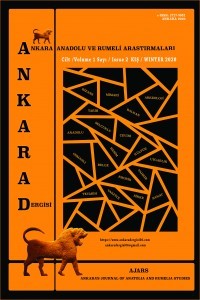BİR VAROLUŞ BİÇİMİ OLARAK DOĞA: İNGİLİZ ROMANTİK ŞİİRİNDE İKİLİK, KAÇIŞ, PANTEİZM VE EŞ-YAZARLIK
Romantizm genel itibariyle sanatta, edebiyatta ise özellikle de bireysel öznellik, yazarlık, düşsellik, sanat, varlığın ikiliği ve doğa kadar kırsal yaşam deneyimi gibi çeşitli tematik unsurları da içine alan bir harekettir. Bu bağlamda, “ekoeleştiri” adlı çatı terim altında toplananları da içeren, çeşitli yakın dönem çalışmalarında da görüldüğü üzere, romantik doğa henüz ekolojik sorunları tartışmaya açıp sert bir edebi tepki alacak veya çevresel korumayı gerektirecek kadar önemli derecede tehlikede değildir. Bundan dolayı, romantik edebiyat eserlerinde dile getirilen insan ve doğa arasındaki ilişkiyi ifade etmek için fiziksel çevrenin metinleştirilmesinin yolları sorunu, panteizmden, varoluşun ikiliği ve ilham ve eş-yazarlığın yanı sıra bir yaşam biçimi ve kültüre bir alternatif olana kaçış gibi unsurlara uzanan sözü edilen eleştiri klişelerinden çok daha karmaşıktır, ki bunlardan ikilik, kaçış, panteizm ve yazarlık romantik bağlamın doğa ile olan dört temel taşını oluşturur. Bu çalışmanın ana amacını, doğanın gerçek şairleri olan İngiliz romantikler Wordsworth, Coleridge, Shelley ve diğer birçoğunun oluşturduğu doğa şiiri ve ekoşiirsel bağlamın tematik karmaşıklığının en önemli yönlerini meydana çıkarmak fikri oluşturur.
NATURE AS A MODE OF EXISTENCE: DUALISM, ESCAPISM, PANTHEISM, AND CO-AUTHORSHIP IN ENGLISH ROMANTIC POETRY
Romanticism is a movement in art in general encompassing in literature, particularly, various thematic concerns such as individual subjectivity, authorship, imaginative flight, art, dualism of existence, and the experience of rustic life as well as nature. Significantly, as it is revealed by various more recent studies, including those comprised under the umbrella term of “ecocriticism”, the romantic nature is not yet seriously endangered as to raise ecological issues and receive an angry literary retort or require environmental protection. Therefore, the question of the ways in which physical environment is textualised to render the relationship between human being and nature as expressed in romantic literary works is much more complex than the above stated critical clichés, ranging from aspects such as pantheism, dualism of existence, and escapism to those of inspiration and co-authorship as well as nature as a mode of living and an alternative to culture, of which dualism, escapism, pantheism, and authorship are the four cornerstones of the romantic concern with nature. To concretize and strengthen this idea by disclosing the most important aspects of the thematic complexity of the nature poetry and ecopoetical discourse by English romantics Wordsworth, Coleridge and Shelley, the true poets of nature, among others, represents the main purpose of our article.
Keywords:
Romanticism, nature, nature poetry, ecopoetry, dualism, escapism, pantheism, authorship,
___
- BLOOM, Harold, Romanticism and Consciousness: Essays in Criticism, W. W. Norton and Company, New York 1970.
- CHASE, Cynthia, Romanticism, Longman, London 1993.
- DAY, Aiden, Romanticism, Routledge, Florence 1995.
- DE MAN, Paul, “Time and History in Wordsworth”, in Chase, 1993, pp. 55-77.
- ESTERHAMMER, Angela, Romantic Poetry, John Benjamins Publishing Company, Philadelphia 2002.
- GARRARD, Greg, Ecocriticism, Routledge, London 2012.
- HART, Kevin, Postmodernism: A Beginner’s Guide, Oneworld Publications, Oxford 2004.
- HARTMAN, Geoffrey H., “The Romance of Nature and the Negative Way” in Bloom, 1970, pp. 287-305.
- KNEALE, J., Romantic Aversions: Aftermaths of Classicism in Wordsworth and Coleridge, McGill-Queen’s University Press, Montreal 1998.
- LEVINE, Michael P., Pantheism: A Non-Theistic Concept of Deity, Routledge, London 1994.
- ISSN: 2717-9052
- Yayın Aralığı: Yılda 2 Sayı
- Başlangıç: 2020
- Yayıncı: Ankara Üniversitesi
Sayıdaki Diğer Makaleler
MUHASEBE DEFTERLERİNE GÖRE İSTANBUL'DAKİ II. BÂYEZİD KÜLLİYESİNİN MADDİ DESTEK SAĞLADIĞI KURUMLAR
BİR VAROLUŞ BİÇİMİ OLARAK DOĞA: İNGİLİZ ROMANTİK ŞİİRİNDE İKİLİK, KAÇIŞ, PANTEİZM VE EŞ-YAZARLIK
Serpil AYGÜN CENGİZ, Gamze Merve ERARSLAN
MÜBADELE İLE TÜRKİYE’YE GELEN SELANİK ŞERİYE SİCİLLERİ
SAVAŞTA VE BARIŞTA BİR YUNAN GEMİSİ: AVEROF YUNAN KAYNAKLARI ÜZERİNDEN BİR ANALİZ
ALMAN ASKERİ VE ALMANYA’DA HAYAT-I ASKERİYE
1844-1944 YILLARI ARASINDA BULGARİSTAN’DA YAYINLANAN TÜRKÇE GAZETELER
Ökkeş NARİNÇ, Çevirmen: Ökkeş NARİNÇ
DEDE KORKUT’UN ÜÇÜNCÜ NÜSHASINDA GEÇEN OLUMSUZLUK VE YOKLUK BİÇİMLERİ
